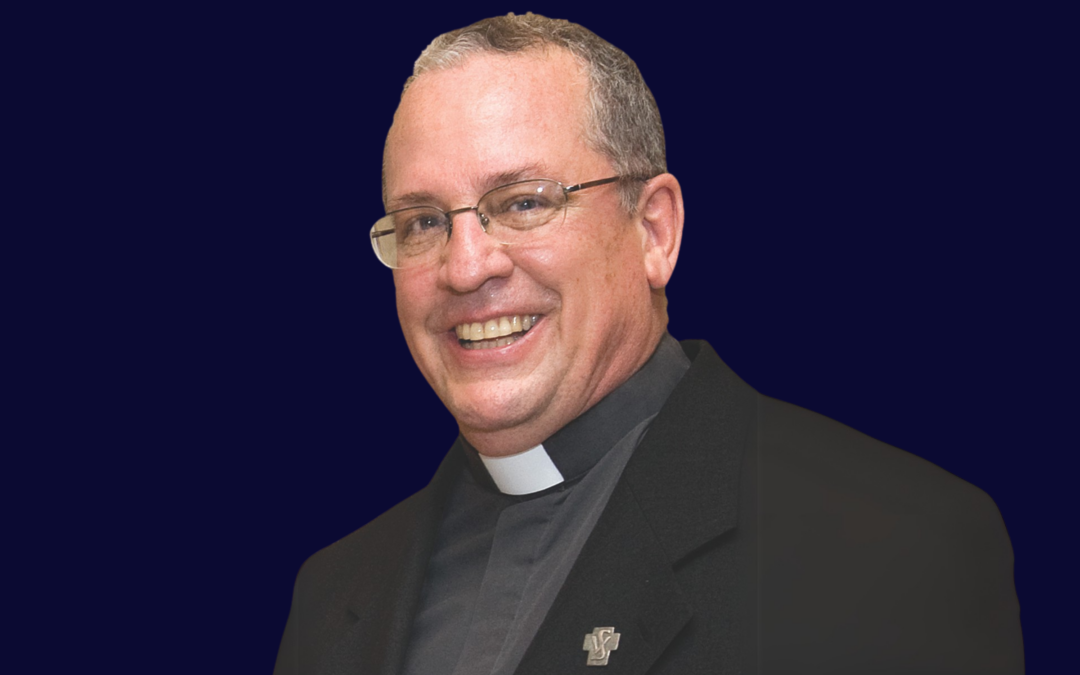In Folleville, France, a small village well beyond the Northern outskirts of Paris, St. Vincent de Paul preached about the importance of Confession on January 25, 1617. He later credited that day as when he understood his life’s purpose: creating the Congregation of the Mission. This purpose would be realized in 1625.
Four-hundred years later, the Eastern Province’s Fr. Gregory Gay, CM, presided over the Eucharist in Folleville celebrating the Vincentians’ 400th anniversary.
You can see all of the Vincentians’ celebrations here.
Here is a transcript:
Considering the context of our celebration of the 400th anniversary of the founding of the Congregation of the Mission, there are some key words from the readings we have heard, on which we can focus to perceive what the Spirit of God wants to say to us today, as members of the Congregation and as members of the Vincentian Family.
In the first reading from the book of the Acts of the Apostles, the context is Pentecost, the day when the Spirit of the Risen Lord touched the heart of Peter and his companions, giving them the ability to speak with strength, with courage to an experience fresh in their hearts and minds. The fact that the Lord and Savior of the world was killed because they were in opposition to his teaching of the Kingdom of God. The apostles were defending not only Jesus Christ but His message of the Kingdom of God.
This reading is what we had reflected on Resurrection Monday, the same day that Pope Francis died, in a prophetic sense because this firmness with which Peter and his companions spoke, is the same firmness that was manifested in the preaching of Pope Francis. The firmness of confronting situations with the desire to renew our church, sometimes provoking much opposition and unfortunately, not only in the civil spheres but also within the church.
Pope Francis was a challenge for traditionalists, because he was pointing out, just like Jesus Christ, the human aspect of our faith, which is sometimes absent in some of our traditions.
Today’s Gospel is addressed to the missionary disciples of that time and obviously to the missionary disciples of our time. The key word is: “went about”, Jesus went about to teach, to proclaim the word of the gospel of the kingdom and to heal. It is an outgoing action. We are invited to leave our comfort zones to go to the peripheries of our world, to the people most in need of love, of compassion, of the presence of those who show solidarity with them.
Continuing with the Gospel it says that: “when Jesus saw the crowd he had compassion”. Seeing: Jesus experienced the reality in which the people lived. In my experience, the Church in Latin America works seriously to make people see the reality of the people. Based on the doctrine of the Church of Vatican II, the Latin American church was one of the few that continually related doctrine to reality. And not only once, but every few years it reevaluated the living of the faith in the light of the reality that the People of God was living.
I think it is enough to say that the challenge for us and the Vincentian Family, in the framework of the 400 years, is to see, know in depth and analyze the reality in which our people live.
This experience of the reality of the poor is what inspired St. Vincent to found the Congregation with the experience of Foleville, January 25, 1617 and about eight months later, in Chatillon. The pain of the people provoked in Vincent a true conversion. My brothers, if we are to renew what is our Charism, we have to feel the reality of those we are serving, not only with feelings but with actions that promote their dignity as beloved children of the Lord.
The Word of God invites us to reflect on our condition of being missionary disciples; if we are willing to go where there is need, where Mother Church invites us, as did St. Vincent, who encouraged his confreres to “go to India”, that is, where the most abandoned are.
We have to ask ourselves: are we willing to go, are we willing to join this Church in going out?
I have had conversations with young confreres. I sensed from them a desire to go out on mission, to encounter the reality of the poor. However, the response of their superiors is usually: they are too young and inexperienced. They prefer to wait a few more years for them to acquire more experience. It turns out that, as time goes by, it becomes comfortable and more difficult for them to leave everything to go to the poor.
We have to ask ourselves if we are more concerned with maintaining what we have, instead of being more open to mobility, to moving around as Jesus himself invites us to do.
We are an international missionary Congregation, however, it could be that the structure of the Province is an impediment to the realization of this missionary outreach. Is it possible that this structure of the Province needs to be revised or restructured?
The world is crying out, our lords and masters are suffering, with whom are we in solidarity, whom do we support, with whom do we walk, with whom do we walk?
We have put a lot of emphasis on vocation promotion since our last general assembly, what is it that moves the youth, what is it that attracts them to the Congregation? In my opinion it is mission. We have to give them the opportunity to participate in the missions, to know the reality of the people who are in conditions that are sometimes more difficult than what they themselves have lived. Let them see the environment of their brothers and sisters, because they are not going to find this reality in depth in the media that often enslaves the youth instead of making them aware of it.
We are invited by the Church to live in a spirit of synodality, with the practice of listening and conversing with the Spirit. Sharing with confreres of all ages, with the laity, with those with whom we collaborate, what do we listen to? And, above all, what do we hear from our lords and masters, does it provoke us to step out of our comfort zone, or are we tempted to maintain the status quo, to keep things as they are, instead of responding to the dynamism of the Spirit?
What allows us to hear the cry of the poor? For St. Vincent it was the situation lived in his time. The suffering of the people is what touched his mind, his heart, and provoked the beginning of something that even he did not expect.
It is not only us who are celebrating these 400 years, but a whole army of people who want to live together with the poor the reality of the kingdom of God. This army is made up of the different branches of the Vincentian Family, the confraternities, other organizations and people of good will. We all have to be open to listen to how the Spirit wants to move us towards the marginalized, excluded, burdened, abandoned and discarded.
The message that Pope Francis left us, initiating this 400th Anniversary Celebration, has inspired us to be Good News for the poor, and even now from heaven, he himself intercedes for us to continue the mission of Jesus Christ: evangelizing and promoting charity, priests and laity, with the same simplicity with which he invites us to leave everything and go to the poor. It is apostolic zeal that opens us to the fire of the Holy Spirit, kindling not only our hearts, but also the hearts of the entire Vincentian Family and beyond.
What inspired St. Vincent was a spiritual need: the deep confession of a peasant and then a bodily need of a suffering family. Both experiences brought about a change, that is, a transformation in the lives of these people.
With this beautiful charism that we have received from the Spirit of the risen Jesus, from the hands of Vincent de Paul and company, we have to ask ourselves if we are really seeing and responding to the new poverties of our time. There is no country, in any part of the world, that can escape the strongest poverty, which is migration. Human mobility is a right, and sadly we see with sadness that they are forced to leave their countries. In some countries our brothers and sisters are being deported, and even rejected, finding borders closed.
Where are our thoughts and our hearts in the face of these realities? What are we doing to respond to this new poverty? And to other poverty linked to it?
We are living a crisis of leadership everywhere in the world, so what are we, as leaders inspired by faith, hope and love, doing, especially in this Jubilee year in which we are on pilgrimage?
We are called to encourage one another. During St. Vincent’s time, he was encouraged by outsiders, such as Madame de Gondi, who by her real needs encouraged St. Vincent to accompany the rural poor. Others of his animators were spiritual directors, who helped him to enlarge his heart with the great mercy of God. There are people in our times who encourage us to develop our capacities to respond to needs with the compassion of Jesus Christ.
We are invited, my brothers and sisters, to stand with the impoverished and with the victims of the abuse of power. We need to be sensitive to the political reality of our peoples, with an effective posture, acting not as individuals, but as a unit, that is, a community.
Remember, we are a community for the mission; we are a family collaborating to carry out the mission, not only for the poor but with the poor.
May the Lord Jesus Christ, who is our inspiration and our life, encourage us to continue to celebrate our Vincentian charism with peace and joy. May it be so!

